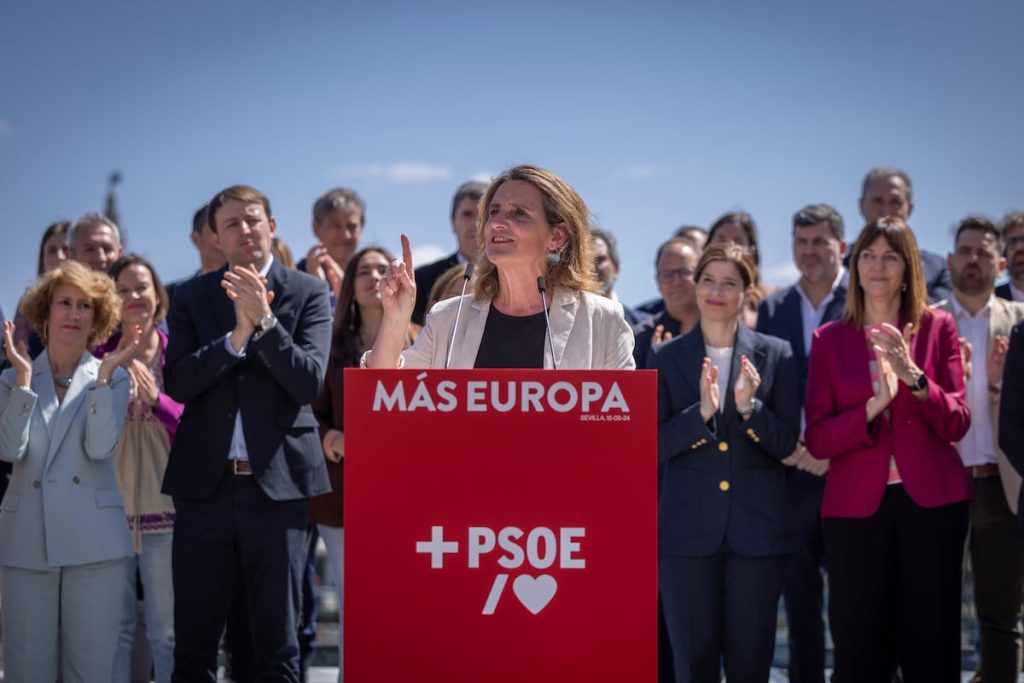The PSOE will be competing in the European elections with their most ideological discourse, in line with the campaign of the last general elections, and using the good results of the PSC in Catalonia as a flag. Their candidate, Teresa Ribera, will go straight for the PP for their pacts with Vox. The socialists will face multiple battles, as the PP is predicting a close race on June 9th after revising their expectations downwards. Encouraged by the victory in Catalonia, the PSOE aims to rally the progressive electorate in the fourth election of a frantic electoral semester, calling for a useful vote to the left of the Government in the face of a particularly polarized electoral contest. Party sources are confident they will not fall below 28% of the vote, and believe that their message of environmental and feminist values, championed by the third vice president, will resonate strongly with young and urban voters.
Pedro Sánchez will devote himself to the two weeks of campaigning, with five rallies already scheduled, including the closing event in Madrid. Former socialist Prime Minister José Luis Rodríguez Zapatero, a key figure in mobilizing the progressive electorate in the last general elections, will also be heavily involved. The PSOE leader has called on party MPs and senators to attend the start of the pre-campaign this Saturday in Barcelona, along with Ribera and Salvador Illa. The plan is for Zapatero to join Ribera in Cadiz on Sunday and to support the candidate along with Morant at the formal start of the campaign in Valencia next Thursday. The following days of the campaign, subject to changes, will include another rally with Ribera in Sevilla on May 24, once again with Sánchez. The main objective will be to mobilize left-leaning voters with a clear European and progressive narrative, aiming to increase participation in a typically lower-profile election compared to general elections. The PSOE will prioritize mobilizing voters who align with their values.
Ribera will traverse Spain during the campaign, but the PSOE’s electoral committee assigns high importance to Andalusia, Catalonia, and Madrid. These three regions account for 16.8 million of the 35.2 million eligible voters. This represents 47.7% of voters, and when combined with the 3.6 million voters in the Valencia region, amounts to 57.9%. The PSC has surpassed the PSOE in Andalusia as the main source of socialist votes, causing concern among party leaders. However, the fact that European elections use a single constituency format favors the interests of the PSOE, as votes will not be lost as they can be in general or regional elections. Spain will elect 61 MEPs, two more than in 2019, which is seen as good news for the socialists in their competition with the PP.
The PSOE believes that the two major parties are more evenly matched than Alberto Núñez Feijóo predicted in February, as the PP has been lowering its forecasts for the upcoming elections. They expect to once again contribute the most MEPs to the social democrat bloc, with a minimum of 28% support likely, translating to around 18-19 MEPs. The socialists obtained 20 seats in 2019, compared to the PP’s 12 seats, and the latter aims to absorb the 7 seats won by Ciudadanos. According to the top echelons of the PSOE, time is not on Feijóo’s side, as he is under more pressure to win than they are, with only a short period left before the next elections in Castilla y León. They emphasize the need for the PP to grow at the expense of Vox, who have shown resilience in recent elections.
The PSOE’s goal is to gather progressive votes, with plans to recognize the Palestinian state in the Council of Ministers before the elections. Their candidate will also highlight their commitment to fighting climate change, contrasting with the PP’s climate ambiguity and Vox’s denialism. They will emphasize the threat posed by the rise of the far-right to the EU. Ribera’s statement in Seville on Wednesday signaled their determination to stop the ultraright and “cowardly right”, and to counter those seeking to destabilize Europe from within. The socialists enter the elections bolstered by their recent successes, ready to fight ideologically against the PP and their alliances with the far-right. The buoyant atmosphere in Ferraz and La Moncloa after the victories in Catalonia and Euskadi contrast sharply with the setbacks suffered in the Galician elections, signalling a renewed vigor within the party.


